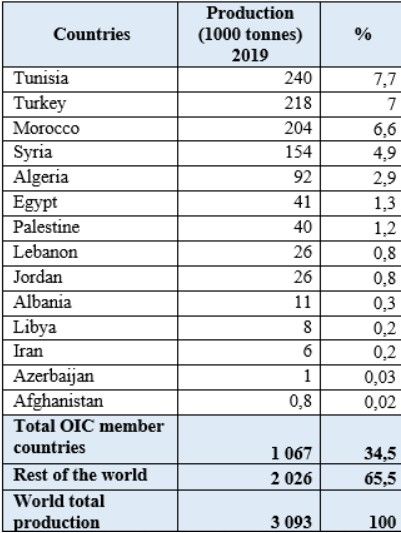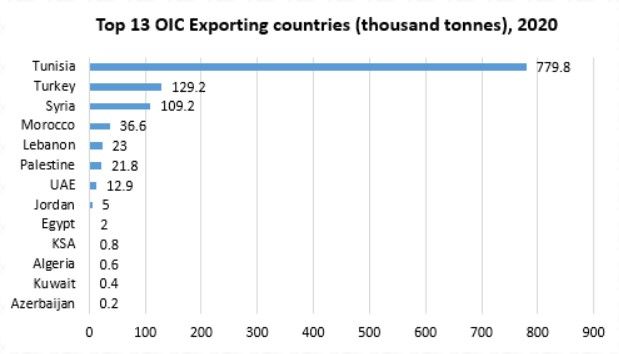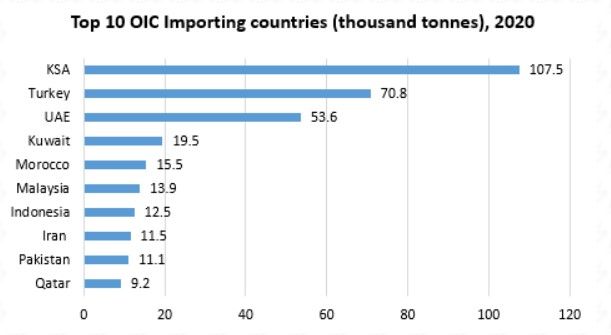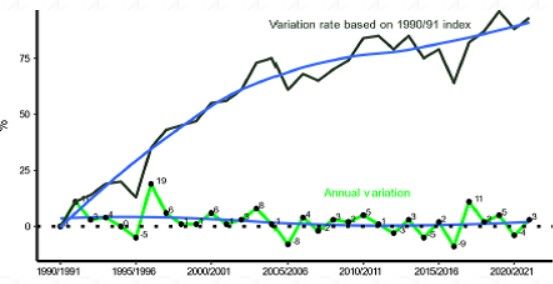1.1. Introduction
The Islamic Organization for Food Security (IOFS) in accordance with Resolution N° 1/46-E adopted at the 46th Council of Foreign Ministers of Organization of Islamic Cooperation (OIC) held in Abu Dhabi on 1-2 March 2019, as well as the mandate was given to the IOFS by the Council of Foreign Ministers, has developed the respective Plan of Action for Development of each commodity in the OIC region, as of Wheat, Rice, Cassava, and Palm Oil.
Development of strategic commodities serves as building-bricks to envisage resilience food security in OIC region. Strategic commodities play a significant part in fulfilling our need to ensure food security and contributing to the stability and prosperity of OIC Member Countries.
At the 4th session of the General Assembly in September 2021, the “IOFS Vision 2031”, the 10-year Strategy document was adopted and approved. The new Strategy contains key strategic pillars, impact goals, and calls for the expansion of the range of Strategic commodities in accordance with the national interests of Member States.
Noting the importance of Olive oil for OIC producing countries and recognizing the importance of this product in world trade, IOFS has decided to add Olive oil to IOFS Strategic Commodities.
Moreover, the importance of the Olive oil for OIC countries was underlined at the Sixteenth Islamic Conference of Foreign Ministers held in Fez, Kingdom of Morocco, 6-10 January, 1986, where the Resolution No.11/16-E on Production, consumption and Commercial Exchange of Olive oil in the Muslim World (hereinafter – the Resolution) was adopted.
The resolution noted the importance of the International Agreement on Olive Oil as an important instrument of cooperation in this field and called member countries to encourage the production of Olive oil and the import of their oil needs from other states.
1.2. Olive Oil Production, Export, Import and Consumption in OIC member states
People's consumption of olives and olive oil has risen in recent years due to a growing interest in long life as well as healthy and balanced eating patterns throughout the world. Olives and olive oil, which are essential commercially and socially in producing nations, are also culturally significant.
The Olive oil production average for the period 2015-2019 was approximately 16 744,1 thousand tons, with an export share of 32,8% to 46,4 % (Figure 1).
Figure 1. Share of Olive oil export in total production. FAOSTAT 2022

OIC member countries account for around 35% of world olive oil production, located primarily in the Mediterranean and North African region. Important OIC olive oil producer countries are Tunisia, Turkey, Morocco, Syria and Algeria. The share of world olive oil production in Tunisia and Turkey is 7,7% and 6%, followed by Morocco and Syria at 6,6% and 4,9% respectively (Table 1).
Table 1. OIC Leading Olive oil producers (2019). FAOSTAT 2022

In parallel with production in olive oil exports, Tunisia takes the first place, followed by Turkey, Syria and Morocco (Figure 2).
Figure 2. Top 13 OIC Olive oil Exporting countries. FAOSTAT 2022

It is seen that the Kingdom of Saudi Arabia, Turkey, The United Arab Emirates take the first places in olive oil imports. Although Turkey and Morocco are producers and exporters among the OIC countries, they are also seen as an important importing country.
Figure 3. Top 10 OIC Olive oil Importing countries. FAOSTAT 2022

Figure 3. 2015-2020 Olive oil Export and Import value. FAOSTAT 2022

In general, for the period 2015-2020 world exports and imports of olive oil increased by 35% and 33% from 1832,4 thousand tons to 2490 thousand tons of exports and from 1918,1 thousand tons to 2545,4 thousand tons of imports.
From 1990/91 to 2020/21, world Olive oil usage nearly doubled. According to preliminary figures for the 2020/21 crop year, consumption will drop by 4.4 percent, to 3 125 000 tonnes. Consumption is expected to exceed 3.2 million tonnes in 2021/22.
Figure 4. Changes in olive oil consumption. Annual rate of change since 1990/91. IOC Bulletin 2022

The biggest rise in consumption is seen in the main producing member countries. Some saw their production and consequently consumption rise sharply, including Egypt, where consumption went from 11 000 tonnes in 1990/91 to 450 000 tonnes in 2020/21. During this period, consumption in Algeria rose from 14 000 tonnes to 285 000 tonnes and Turkey from 110 000 tonnes to 325 000 tonnes[1].
MEETING ON PROMOTION OF OLIVE OIL
Noting the importance of Olive oil for OIC producing countries and recognizing the importance of this product in world trade, IOFS seeks to assist in supporting the sustainable and responsible development of Olive cultivation in the OIC member states, to strengthen the Olive oil industry, provide assistance in boosting intra-OIC trade and raise awareness of Olive oil and its many benefits with collaboration of specialized international and regional institutions.
The purpose of the IOFS is to stand with member countries to support their demands and work with them to strengthen the Olive oil industry in OIC member countries, as well as providing assistance in boosting intra-OIC trade and raise awareness of Olive oil and its many benefits. Production and productivity are important and vital, but quality remains the ultimate goal.
Considering the above-mentioned, the IOFS in cooperation with the Ministry of Agriculture, Water Resources and Fisheries of Tunisia, OIC institutions, International and regional organizations, as well as with support of the Ministries of Agriculture and research institutions of selected OIC member states (Algeria, Azerbaijan, Egypt, Jordan, Kazakhstan, Lebanon, Libya, Morocco, Palestine, Pakistan, Saudi Arabia, Turkiye) is planning to conduct the “The First Meeting on promotion of Olive oil in OIC member countries”, on 23-24 June, 2022, in Tunis, Republic of Tunisia.
The IOFS’s two-day Meeting pursues lofty goals: to provide the finest representation of the Olive oil industry of the OIC member countries, as well as a meeting place for experts from the Olive oil producing, exporting and consuming countries to consolidate their activities and enter new markets.
The Meeting will be devoted to discussion of the areas of collaboration through the exchange of experiences and finding common ground in the development of Olive oil research institutions. It also provides a premier interdisciplinary platform for researchers, practitioners to present and discuss the most recent innovations, trends, and concerns as well as practical challenges. The Meeting is expected to be participated by leading academic scientists, researchers, scholars and representatives of ministries of agriculture and research centers of OIC member countries, OIC institutions, and international organizations.
2.1 Objectives of the Meeting
To discuss current challenges of the Olive oil industry in OIC member countries and explore ways of solutions;
To discuss matters of interest in the fields of standardization, research and the study of methods of analysis to guarantee the quality and authenticity of Olive oils.
To strengthen the cooperation among agricultural research institutes research centers and international organizations of OIC member states specializing in the study of quality and new technologies and share their experience and practices on developing Olive oil industry;
Proposing and advocating strategies of modernization of the Olive oil industry in OIC member countries, including:
Promotion of a participatory approach to research by involving olive growers in R&D programs;
Presenting and discussion of implementing ‘zero tolerance’ polices as regards compliance with hygiene, food safety and health standards;
Presentation of latest processing technology to investors and owners;
Export opportunities and facilities such as appropriate packaging, storage, etc.
Export supporting initiatives.
Format: In-person with extending to online participation.
Time: 23-24 June 2022
Venue: Tunis, Republic of Tunisia.
Language: English (interpretation into Arabic)
Link to the Zoom Meeting
https://us06web.zoom.us/j/82148081905?pwd=cyswZFhVeko1QkRIQ2FUOVhNeFFMZz09
2.2. Participants:
Participants will include representatives of government authorities, research and science entities of OIC member states, international and regional organizations.
Participants will represent the following OIC Member States: Algeria, Azerbaijan, Egypt, Jordan, Kazakhstan, Lebanon, Morocco, Palestine, Saudi Arabia, Tunisia, Turkey
The government authorities will be represented by the Ministries responsible for food security and agricultural development of the mentioned OIC Member States.
The international and regional organizations, working or interested in the topics of food security, agriculture, education and other development projects, will be also welcomed to attend the Meeting.
[1] https://www.internationaloliveoil.org/wp-content/uploads/2022/03/ioc-newsletter-171-merged.pdf






